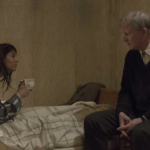
Spoilers ahead
…the function of the priests is to prevent the first, highest, level of cosmic eating, the eating of human mortals by gods. How? By way of performing sacrificial rituals. Gods must be appeased, their hunger for blood must be satisfied, and the trick of the priests is to offer the gods a substitute (symbolic) sacrifice: an animal or other prescribed food instead of human life. The sacrifice is needed not to secure any special favors from the gods, but to make sure that the wheel of life goes on turning. Priests perform a function which concerns the balance of the entire universe: if the gods remain hungry, the whole cycle of cosmic life is disturbed.
Slavoy Zizek, Living in the End Times
You’ve seen this movie before, or at least the beginning of it. A small group of young people set out for a weekend at The Cabin in the Woods. A cranky old man tells them to turn back. They don’t. They shouldn’t go into the basement. They do. They shouldn’t mess with the several thrift stores’ worth of trinkets in the basement. They do.
It’s as familiar as the French maid, the tightly corseted dominatrix, the Catholic schoolgirl, the leatherman in the officer’s cap.
It becomes clear that Dana, Marty and the other students are being influenced by drugs and subliminal messages to confirm to their particular archetypes. The technicians in their underground control room leave nothing to chance, through technologies of of surveillance and control, all so they can play out a predetermined script. There may be variations (maybe we’ll get to see the Merman this time around?) but the outcome is the same.
Furthermore, this scenario has been played out many, many times before. (The credits sequence shows illustrations of human sacrifice from ancient times.) There are several steps of transgression they must commit, or rather, are manipulated into committing. A masochist may concoct a reason for punishment (e.g. TE Lawrence wrote letters from a fictional uncle describing a fictional crime and how he was to be beaten for it), or a sadist may concoct their own reason.
In this particular instance, the punishment is a bloody attack by an “Zombie Redneck Torture Family.” (Though it doesn’t particularly matter what the monster is.) There is a familiar Gothic backstory to these creatures with the usual elements of the past remaining unburied, of sexuality being an uncontrollable force, et cetera, but the real Gothic story is actually much deeper and darker.
To me, the most disturbing scene is when all of the other young people are dead and Dana (“the Virgin”) is fighting for her life alone against the leader of the zombies. What’s upsetting is that the technicians in the control room are not watching her struggle at all. They paid more attention to whether Jules (“the Whore”), after being stoked on aphrodisiacs, would show her breasts. As far as they are concerned, their job is over, the ritual is completed and it is time for celebrating with drinks (or just drinking).
As we learn later in the story, while the other four youths must die, “death of the Virgin is optional”. Whether Dana (“the Virgin”) lives triumphantly or dies tragically, it does not matter. (What happens to Virgins who do survive is not shown.) If Whedon’s earlier character Buffy the Vampire Slayer is a professional Final Girl, Dana’s situation completely explodes the Final Girl concept. It doesn’t matter if she represents a feminist statement of female strength, or a conservative statement of virtue (i.e. abstaining from sex and/or drugs). It’s a non-issue. The work of the process is done, and that work is torture.
The Virgin must not die before anybody else because she must suffer as much as possible. She must experience intolerable pain and fear, witness the death of her friends, witness the existence of nightmares that defy reason. And the Elder God, and we in the audience, watch that suffering.
And why?
There’s a throwaway joke early in the movie, when two characters do a riff on the anti-drug PSA: “I learned it from watching you.” If, as the Director says, this situation is ultimately about “youth”, or rather a conflict between generations, then there is an additional breach of generations between the Elder God and the vast technocratic organization that appeases it. The cruelties inflicted by the technicians on the youth, their consumption to extract their exchange value, are a reflection of the deferred consumption from the Elder God that slumbers below.
That’s what the Director offers Dana, the logic underlying all of this: kill your friend to appease a god, accept the logic of “commit lesser atrocities to prevent greater atrocities.” That’s why the Director and another character urges Dana to kill Marty instead of killing him herself. Arguably it’s even more suffering to know you killed your friend than to know a stranger killed him. It’s not a big leap to speculate that the Director is a previous Final Girl/Virgin who made a similar choice and became part of the same organization that engineers this ritual. She understands, better than anybody else, that this is ultimately not about the humans but the Elder God watching. (Cf. in Graphic Sexual Horror, when PD berates a model during a live video shoot on Insex.com, telling her that it’s not about him or her, but the people paying to watch right now.)
This also follows the anarchist tendencies in Whedon’s works; hierarchical institutions are ineffectual at best and corrupt and corrupting at worst, whereas loosely organized affiliative groups do useful work and foster healthy individuals. Even the zombies and mutants and angry molesting trees and killer robots can’t help being what they are; it’s the humans who manage them who are the true monsters.
There’s an interesting parallel here between The Cabin in the Woods and The Hunger Games. In the latter, Katniss “volunteers” to participate in gladiatorial combat to the death. (Actually, she volunteered to keep her younger sister, who was chosen by lottery, out of the games.) Whether Katniss lives or dies is a dilemma for her (if you don’t die, you turn into a psychological wreck), but not for the people who run the Games. They don’t care which of the 24 boys and girls wins, they just want a good show. Katniss’ acts of courage or mercy might matter to her, but not to anybody else. If anything, the masters of the game approve because her actions make for a better spectacle.
Both Dana and Katniss are in situations where they have to fight to survive, but the real challenge is to break out of that scenario, to not perform sadism or masochism for others. Cabin ends on ambivalent note: better to let the world end than to break trust between friends.



